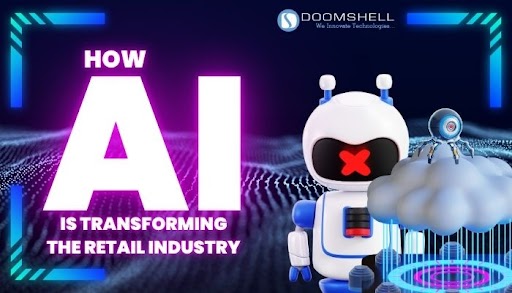Key Takeaway
- AI is revolutionizing the retail industry by improving decision-making, streamlining operations, and customizing customer experiences using data-driven approaches.
- Retailers leverage AI for high-impact areas like demand forecasting, customer support chatbots, dynamic pricing, and fraud detection to enhance operation efficiencies and effectiveness.
- The blending of AI and retail correlates with higher sales, lower operating costs, improved stock management, and increased customer loyalty.
- Retailers must consider challenges across data accuracy, integration, privacy, and costs of implementation to ensure responsible use of AI technologies.
- The global AI in the retail market is rapidly expanding, driven by the adoption of AI-based tools by companies seeking to improve their customer experience and remain competitive with changing customer expectations.
Market Analysis of Global AI in the Retail Industry
- The global audiovisual in retail market is growing rapidly and is projected to grow from about USD 12 billion in 2024 to over USD 40 billion by 2030, mainly driven by increased adoption of automation and data analytics in the retail operation
- North America is the largest market driven by sophisticated retail infrastructure and early adoption of AI, while Asia-Pacific is one of the fastest growing markets as digital transformation takes place and e-commerce continues to grow.
- Major growth factors in this context primarily include increasing demand for the personalized shopping experience, better inventory management, customer engagement, and supply chain efficiency due to AI.
- Retailers are spending significant amounts of money on AI-powered solutions including recommendation engines, chatbots, visual search and predictive analytics for better decision making and profitability in business.
- Despite the rapid growth, there still exist challenges i.e. privacy, systems integration, affordability and skills and experience that provide obstacles for retail to embrace AI as smoothly as possible.

Introduction of Ai in Retail In Industry
The use of AI in the retail sector means that artificial intelligence technology has emerged, utilizing machine learning, computer vision, and natural language processes into retail operations for operational improvements, personalization, and enhancement of decision-making. This technology allows retailers to collect and analyze larger data sets from customer behavior, sales cycles, and inventory to make better business decisions. By using AI, retailers can analyze and offer a personalized product recommendation, automate customer service with the use of chatbots, predict demand, optimize prices, and save costs in operations. Overall, AI enables us to think of retail as an industry driven by data in a customer-centric manner that provides fast, smart, and “more” experience.
How AI is Transforming the Retail Industry
1. Customized Experiences for Customers: AI enables retailers to gain insights on customer preferences and behaviors, based on their browsing history, purchase history, and searches. From there, retailers can derive personalized product recommendations, targeted offers, and unique shopping experiences, making customers feel like they have been properly considered, resulting in improved customer satisfaction and brand loyalty.
2. Intelligent Inventory & Demand Forecasting: With predictive analytics, AI helps retailers forecast the demand for a product with a higher degree of precision. By analyzing patterns in previous sales, seasonality, and further estimating future performance, retailers can ensure their stock levels are being managed to be the best for customer service, while minimizing overstock and stockouts. This will allow retailers to better manage their resources, avoid waste, and improve their profitability.
3. Improved Customer Service: With the introduction of AI-powered chatbots, the customer service experience has been transformed, as chatbots can instantly respond to inquiries and guide customers throughout their shopping experience. Customers can access chatbot services 24/7 to help with common problems, assist in navigating product selection, and provide help with shopping and order processes, all without requiring as much human services interaction.
4. Dynamic Pricing and Real-time insights: AI provides opportunity for retailers to adjust prices dynamically using factors like market demand, competitor prices, and customer actions. The goal is to maximize sales and profits and maintain a competitive role. Leveraging AI-based insights also provides managers with the ability to make faster and data-supported decisions that lead to better performance.
5. In-store operational and safety improvements: AI uses computer vision and image recognition to improve in-store efficiencies by monitoring shelves, capturing foot traffic, and detecting empty spaces. AI can also improve safety by accommodating a real-time approach to identifying suspicious activity or fraud. These changes lay the foundation of more intelligent, safer, and responsive physical retail space for both the business and customer.
Benefits of AI in Retail Industry
1. Automating Tasks: AI streamlines routine and repetitive tasks for retailers which makes it faster and more accurate. Moreover, with AI, retailers can analyze large data sets to anticipate customer demand, oversee inventory, and price products more effectively. For instance, AI chatbots can handle relatively simple customer questions while store staff dedicate more time to more complex customer inquiries while being far more efficient overall.
2. Enhancing Marketing & Sales: AI advances marketing and sales in personalized recommendations and targeted promotions. By examining shopping behavior at an individual level, AI enables retailers to have the right offer available for the right customer at the right time. In addition, AI provides valuable insight into market trends and competitive pricing to enhance the effectiveness of marketing campaigns to understand if your plan is working.
3. Smarter Decisions: AI enhances retailers’ capabilities for making faster, data-driven decisions about real-time data in terms of customer behavior, sales, and supply chains. For example, AI allows businesses to understand demand forecasting, pricing, and promotion plans to ensure retailers can remain somewhat competitive in an ever-changing market.
4. Minimizing Errors & B2B Cost Reductions: AI minimizes the human error that often accompanies manual reporting through automating data collection and analytical processes. AI also reduces expenses through enhanced inventory management, which eliminates excess waste, and optimizations that reduce the need for staffing levels. Put simply, while retailers profit from the opportunity to save (money) and operate more efficiently, they are also saving in the process.
5. Increased Customer Satisfaction: AI personalizes all customer interactions! From customized product recommendations to instant assistance from chatbots, AI streamlines the shopper experience. Shop owners can uncover what customers want and provide a seamless buying experience, making it feel as though it was created just for them. This ultimately increases satisfaction and cultivates long-lasting loyalty.
Application of AI in Retail Industry
1. Inventory Management: AI assists retailers in making sure they have the right amount of stock on hand by evaluating consumer purchasing patterns as well as supplier delivery data. In doing this, AI accurately predicts demand for the future, so popular products are always in stock, while the retailer is not creating an excess of unknown slow moving items. This helps the retailer balance warehousing costs while increasing thermal efficiency and returns.
2. Demand Forecasting: Through AI systems analyzing past unit sales history, it can accurately predict demand (as a whole) for a product. By observing trends and seasonally significant changes in demand, retailers can uniquely plan for supply units and ultimately reduce waste, which creates a more sustainable trajectory and competitive advantage for the business through superior planning.
3. Route Planning: AI driven route optimization tools bolster delivery logistics by finding (real time) the fastest and cost-efficient delivery routes. They take real time cost factors such as traffic, weather, and road conditions into consideration. The outcome is a business that has lower fuel costs, happy customers, and improved logistics functions.
4. Price Optimization: AI allows retailers to remain competitive by adjusting prices accordingly to market conditions, customer behavior, and the competition. AI can ultimately provide suggestions for the ideal price point to maximize sales while maximizing profit, and keeping customers satisfied. Retailers can also leverage AI intelligence for more strategic and productive discount pricing and promotional strategies.
5. Assortment Planning: With the ability to analyze a wide scope of customer data, AI is able to provide insights into buying trends and preferences across stores and locations. This insight will provide a more customized and localized product offering that is relevant to the target customers of your retail stores. As a result, retailers are able to maximize sales based on trending and in-demand products.
How Does AI in Retail Impact Business
1. Customized Customer Experience: Artificial Intelligence provides retailers with the ability to offer extremely customized shopping experiences, based on the analysis of customer behavior, buy history, and interests. Whether the customer is shopping online or in-store, AI recommends products, customizes promotions, and tailors content for each shopper. In addition to improving shopping engagement and satisfaction, AI also establishes customer loyalty and introduces repeat purchases.
2. Smarter Inventory and Demand Forecasting: Using AI technology, retailers are able to forecast which products, where, and when will be in demand. AI can process seasonalities, regional preferences, and inventory sales data to level stock appropriately. AI minimizes the risk of stocking too much or too little inventory, reduces waste, and assures customers can get what they need, with helps sales and makes operations more efficient.
3. Dynamic Pricing: AI allows retailers to adjust prices on the go, or in real time, based on demand, competitor pricing, and customer behavior. In this way, retailers can stay competitive while maximizing their profit potential. AI and predictive analytics also allow retailers to predict and plan for strategic discounts and promotional offers, enabling them to respond dynamically to market conditions.
4. Supply Chain and Logistics Optimization: AI improves logistics by optimizing delivery routes, predicting supply chain disruptions, and managing inventory across multiple locations. It ensures smoother operations, reduced transit times, and better coordination between suppliers and stores. This results in faster deliveries and greater customer satisfaction.
5. Efficient Customer Service and Store Operations: AI-powered chatbots and virtual assistants handle frequent customer queries, offering instant and accurate responses. Meanwhile, AI-driven analytics help retailers plan efficient staffing schedules and optimize store operations, including energy management and layout design. Together, these innovations lower costs and enhance the overall retail experience.
Conclusion
Artificial Intelligence is transforming the retail sector by offering highly customized customer experiences, improved inventory and demand forecasting, and improved operations through data-driven insights. Retailers who leverage Artificial Intelligence technology can improve customer satisfaction, improve operational efficiencies, and remain competitive in an ever-evolving work environment. As technology continues to advance, its influence on the future of retail will increase this year and beyond, making it an essential tool for innovation, growth, and sustainability. Choose the best web development companmy In India
Also Read
Cloud-Native Application Development: A Modern Approach to Scalable Apps










 sales@doomshell.com
sales@doomshell.com
 +91 8005523567
+91 8005523567



